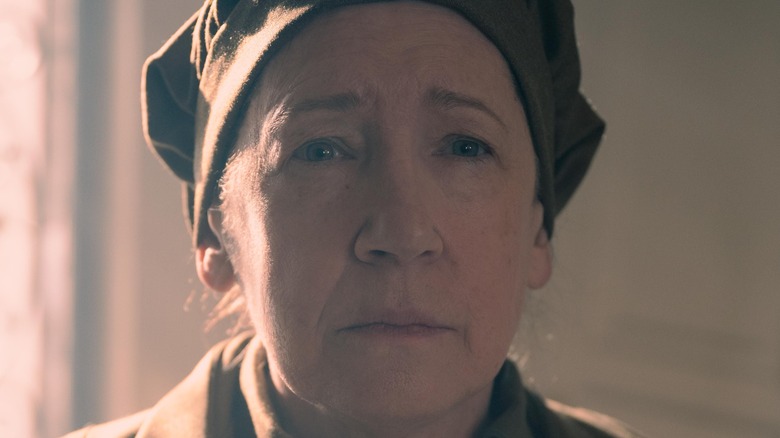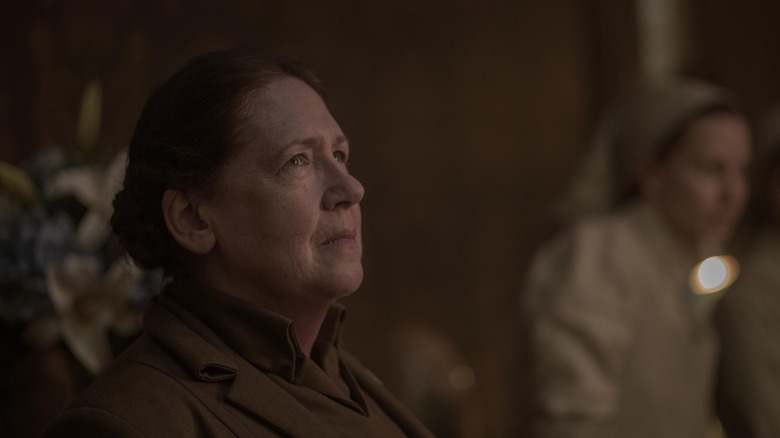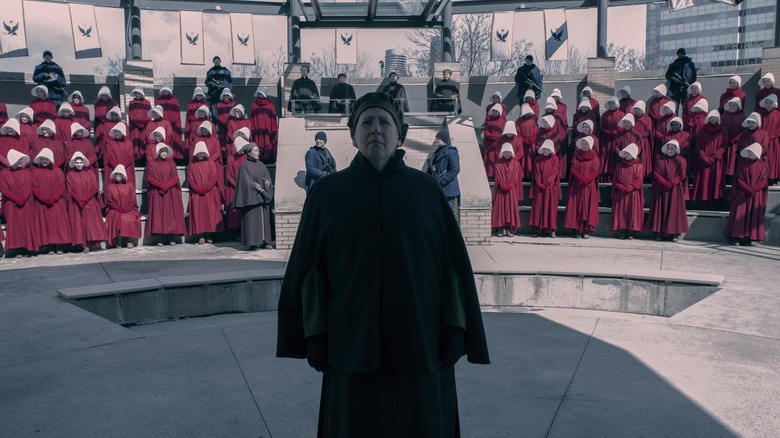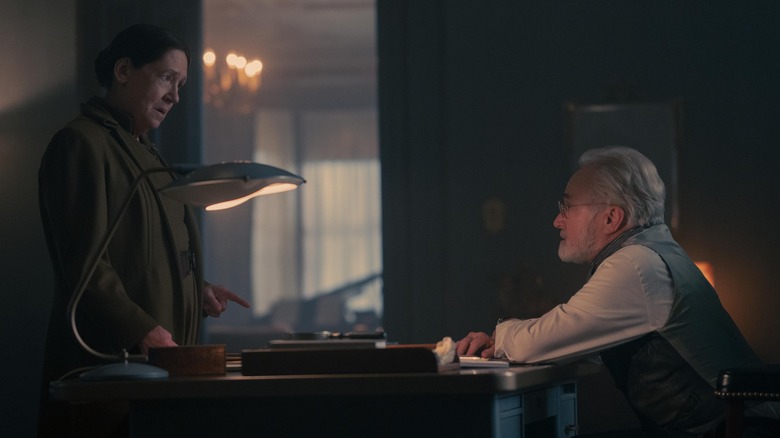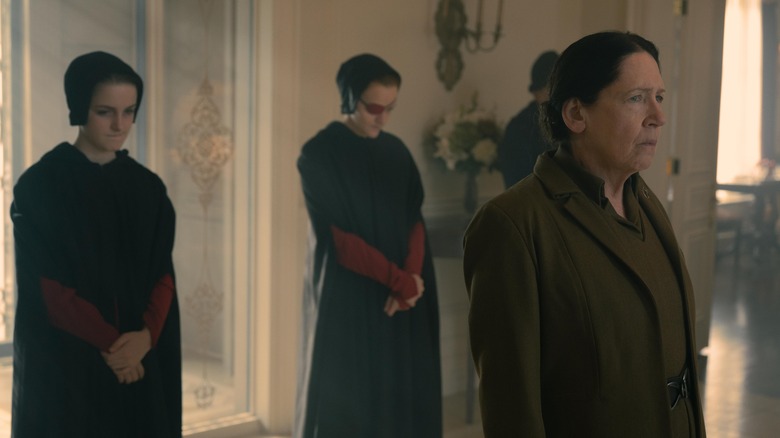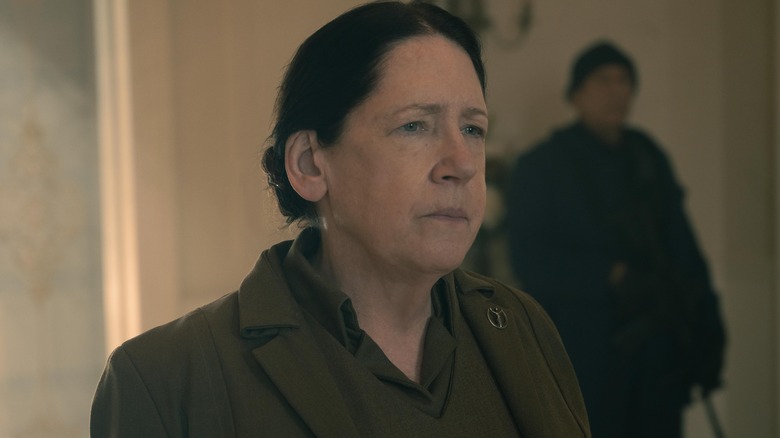What Aunt Lydia's Stunning Revelation Could Mean For The Final Seasons Of The Handmaid's Tale
We may receive a commission on purchases made from links.
The men of Gilead keep flying closer to the sun and Aunt Lydia is starting to smell the smoke in her own feathers. In a short time span, she's been hit with too much lifting of Gilead's veil and, much like Elisabeth Moss's June Osborn, can't wash the blood off of her hands. What she can do, however, is show people the blood and tell people where it came from.
In case you've forgotten Aunt Lydia's story up to this point, let's backtrack. In Season 1 of Hulu's "The Handmaid's Tale," Aunt Lydia is presented as the Queen Aunt, ruling over the realm of the handmaids. Positive reinforcement may have been a tool she had used as a family court judge or teacher, as we learn Lydia was during Season 3, Episode 8, but as an aunt in Gilead, Lydia has relied heavily on physical and psychological punishment to keep her "girls" in line.
As much as "The Handmaid's Tale" is a survival story, it's also the story of mothers and daughters. June is doing everything she can to save her daughters from Gilead. Doesn't Lydia believe she's doing the same? June, like Lydia had done, is losing focus on why she started fighting to begin with. But in the wake of almost losing her favorite pseudo-daughter, Lydia is starting to see Gilead in a new light, one that more closely resembles the fires of hell than candles burning in a church.
Aunt Lydia reveals her motivations
We're less than halfway through Season 5 of "The Handmaid's Tale" and already we're seeing major changes coming from some of the biggest supporting characters. Janine, for instance, was able to handle an interaction with Angela with no drama, earning her affectionate words from Mrs. Putnam before Fred's funeral in Season 5, Episode 2, "Ballet." Instead of trying to break the system, Janine is trying to work inside of it — and is trying to help Esther do the same.
Ann Dowd, the actress who plays Aunt Lydia, told The Hollywood Reporter Lydia feels responsible for Janine. "[Aunt Lydia] can't quite forgive herself for taking that eye out. That was an emotional response to a girl who had the nerve to curse right in her face," Dowd explained, "when she already said that's not a word we use and she said it anyway." Lydia wants to do everything she can to keep her girls safe, Dowd says, and taking Janine's eye was a moment of weakness.
It's a weakness that Lydia pleads with God to forgive. In Season 5, Episode 3, Lydia bargains with God in an attempt to save Janine's life. "I know you're unhappy with my behavior," she says. "Sometimes I've lost my temper. I was trying to keep my girls safe." This is a sentiment she repeats in Season 5, Episode 4; she explains to Janine she thought she "gave [her] the education you needed to live a safe and meaningful life."
How Aunt Lydia really feels about the handmaids
Of the many lessons the men of Gilead need to be taught, one of the major ones that are proving fatal is to not get between a mother and her children. That includes surrogates, and not just the children given to the commanders and their wives. Aunt Lydia loves her handmaids in an obsessive, possessive way that is meant to help them survive. But everyone's lives, including Lydia's, would've been easier if she never created the handmaid system to begin with.
In Margaret Atwood's "The Testaments," you learn first-hand how Lydia survived Gilead's formation. According to Ann Dowd, who also read Lydia's chapters in the audiobook, Lydia being a true believer in the show adaptation humanized her character more; it's hard to empathize with the ugliness that comes out of everyone's fight-or-flight survival mode (via The Hollywood Reporter). But believing fully in what Gilead stands for has meant looking away and shutting people out. As Dowd explained to The Hollywood Reporter, "To live the way Lydia lives and the way Gilead operates, you have to have built walls that are strong and tall because you cannot let too much in."
But unfortunately for Lydia, she has let people in: the handmaids she's trained over the years. Only now Lydia's starting to realize — at least according to Dowd, who wasn't sure of Atwood's intentions — the system she helped create is endangering her girls more often than it's keeping them safe.
Lydia's tactics have changed
The exact details of that "meaningful life" Aunt Lydia thought she was preparing her surrogate daughters for have started to clarify in Season 5 of "The Handmaid's Tale." In Season 5, Episode 2, Aunt Lydia is asked to leave Esther — a young handmaid with a history of sexual abuse and trauma — alone with her potential commander. If Aunt Lydia was trying to ignore the signs that Gilead is a lie before, it's impossible to know that Janine has almost been taken from her.
To drive that point home, Aunt Lydia is given a sharp dose of reality during a visit with Commander Lawrence in Season 5, Episode 4, "Dear Offred." Ann Dowd told The Hollywood Reporter in an interview that when Gilead was created, "It wasn't about [the commanders] having sex with these handmaids unless it was in the monthly protocol that was established for the purpose of conceiving a child" — which is why Lydia comes to Commander Lawrence with a "new" plan for how the handmaid system should run.
Instead of postings, she tells Lawrence that handmaids should be kept at the Red Center and visited by commanders and their wives for their once-a-month ceremonies. "What are you smoking? No commander is going to buy into that," Lawrence tells her, adding, "They're not interested in a quick in-and-out to make a baby. They want those girls in their homes — accessible, anytime."
Is Aunt Lydia switching sides?
In her interview with The Hollywood Reporter, Ann Dowd admits that Aunt Lydia is changing in a lot of "powerful" ways. For one, Dowd says Lydia is very over the commanders and their nonsense. "Enough is enough," Dowd told The Hollywood Reporter. It's why Lydia feels as though Fred "deserved to die" and that what June did was what needed to happen.
When Aunt Lydia is met with Commander Lawrence's bleak, but true analysis of the commander-handmaid relationship in Season 5, Episode 4 of "The Handmaid's Tale," something new seems to take hold of her. Already we've seen hints of Lydia's skepticism; in this episode in particular, camera angles are used to show where characters fall, morally speaking. In the scene between Lydia and Lawrence's eye-opening conversation, Serena and Luke stand-off. Serena is framed to the left while Luke is very much to the right, even when he's telling Serena he's going to let June kill her.
In the scene between Aunt Lydia and Commander Lawrence, both are framed to the right of center. Prior to this scene, she's usually centered.
If Lydia does join Mayday, Dowd doubts Lydia will tell anyone. "She has tremendous patience and she knows how to stay alert and aware," the actress told The Hollywood Reporter about her character. "[Lydia] has her sources. She keeps it private and hidden, but she has it all." Like the biological parents of the children handed out to Commanders. Gilead beware.
What this will mean for Aunt Lydia in the Handmaid's Tale spin-off, The Testaments
When Margaret Atwood was writing "The Testaments," she told TIME that when it came to writing about Aunt Lydia, she wanted to answer the questions of how you could turn into what Lydia became, how you can survive as a woman within Gilead, what Lydia's goals were, given her "secret yet significant power."
Set 15 years after "The Handmaid's Tale," Atwood's sequel is a collection of three women's testimonies about the fall of Gilead. According to Newsweek, Bruce Miller plans to follow this structure in the upcoming television adaptation, which is set to start after Season 6 — the final season — of "The Handmaid's Tale."
As The New Yorker reminds us, "The Testaments" is Lydia's confession and justification of her creation — and eventual dismantling — of the handmaid system. It was her idea to keep handmaids a completely separate "sphere," one in which Lydia was able to operate freely in from the beginning. Since Lydia set up this sphere, she knows exactly what to do to bring it down: make the secret lives of the commanders public (via Vanity Fair). "They will come too late, the Eyes," Lydia says in Atwood's book. "My messengers have flown."
Her messengers, Vanity Fair explains, fly to Canada, where it's her belief a public relations campaign will bring Gilead down. What role Lydia will play in Gilead's downfall remains to be seen — and we cannot wait to watch.
